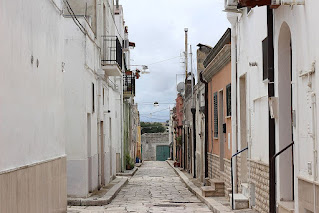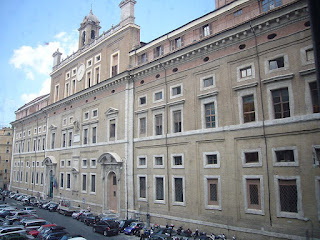Salvator Rosa – artist
Exciting Baroque painter inspired others
Salvator Rosa, a fiery and flamboyant character who was a poet and actor as well as an artist, died on this day in 1673 in Rome. One of the least conventional artists of 17th century Italy, he was adopted as a hero by painters of the Romantic movement in the 18th and 19th centuries. He mainly painted landscapes, but also depicted scenes of witchcraft, revealing his interest in the less conventional ideas of his age. These scenes were also sometimes the background for his etchings and the satires he wrote. Rosa was born in Arenella on the outskirts of Naples. His father, a land surveyor, wanted him to become a lawyer or priest and entered him in the convent of the Somaschi Fathers. Rosa was interested in art and secretly learnt about painting with his uncle and his brother-in-law, Francesco Fracanzano, who was a pupil of Jose de Ribera. Rosa later became an apprentice to Aniello Falcone, working with him on his battle scenes. His own paintings featured landscapes overgrown with vegetation and beach scenes with caves, peopled with shepherds, seamen, soldiers and bandits. Read more…
_______________________________________
Cesare Beccaria - jurist and criminologist
Enlightened philosopher seen as father of criminal justice
The jurist and philosopher Cesare Beccaria, who is regarded as one of the greatest thinkers of the so-called Age of Enlightenment in the 18th century, and whose writings had a profound influence on justice systems all over the world, was born on this day in 1738 in Milan. As the author of a treatise On Crimes and Punishments (1764), which was a ground-breaking work in the field of criminal law and the approach to punishing offenders, Beccaria is considered by many academics to be the father of criminal justice. The treatise, which Beccaria compiled when he was only 26 years old, condemned the death penalty on the grounds that the state does not possess the right to take lives and declared torture to be a barbaric practice with no place in a civilised, measured society. It outlined five principles for an effective system of criminal justice: that punishment should have had a preventive deterrent function as opposed to being retributive; that punishment should be proportionate to the crime committed; that the probability of punishment should be seen as a more effective deterrent than its severity. Read more…
____________________________________
Gianluca Festa - footballer
Sardinian became a favourite in England
The footballer and coach Gianluca Festa, who played 177 matches in Italy’s Serie A but is best remembered as the first Italian defender to sign for a club in England’s Premier League, was born on this day in 1969 in Cagliari. Festa joined Middlesbrough in January 1997 after manager Bryan Robson agreed to pay Inter-Milan £2.7million for the centre-back, who joined his Italian compatriot Fabrizio Ravanelli at the northeast England club. Ravanelli had arrived in England the previous summer as one of a number of Italian stars to move from Serie A, a sign that the Premier League was beginning to challenge Serie A for the right to be called Europe’s top league. Chelsea had signed Gianluca Vialli from Juventus and Roberto Di Matteo from Lazio, to be joined by Parma’s Gianfranco Zola later in the autumn, and Sheffield Wednesday had bought Festa’s former Inter teammate Benito Carbone. Four of those five were forwards - Di Matteo operated in midfield - and Middlesbrough, who had been promoted in 1995 but were finding their second season difficult, broke new ground by tapping into Italy’s reputation for producing top-quality defenders. Read more…
_______________________________________
The murder of Julius Caesar
He came, saw, conquered... and was assassinated
Statesman and soldier Gaius Julius Caesar was murdered on this day in 44 BC in Rome. His death made the Ides of March, the day on the Roman calendar devised by Caesar that corresponds to 15 March, a turning point in Roman history, one of the events that marked the transition from the Roman Republic to the Roman Empire. Caesar had made his mark as a soldier in Asia Minor and Spain and established himself as a politician, making useful allies. But his invasion of Gaul took several years and was the most costly and destructive campaign ever undertaken by a Roman commander. Afterwards, Caesar crossed the Rubicon - a river that formed a northern border of Italy - with a legion of troops, entered Rome illegally, and established himself as a dictator dressed in royal robes. On the Ides of March, Caesar was stabbed to death by a group of rebellious senators led by Marcus Junius Brutus. His adopted heir, Octavian, later known as Augustus, rose to power afterwards and the Roman Empire began. Far from sealing his reputation as a vainglorious tyrant, his assassins, Brutus, Cassius and the others, succeeded only in clinching Caesar’s historical immortality. Read more…
_______________________________________
Giuseppe Mezzofanti - hyperpolyglot
Roman Catholic Cardinal could speak 38 languages
The death occurred in Rome on this day in 1849 of Cardinal Giuseppe Caspar Mezzofanti, a prodigiously talented academic renowned for his command of multiple foreign languages. Defined as a hyperpolyglot - someone who is fluent in six languages or more - Mezzofanti is said to have full command of at least 38. The majority were European, Mediterranean or Middle Eastern languages - mainstream and regional - but he was also said to be fluent in Chinese languages, Russian, plus Hindi and Gujarati. His fame was such that he became something of an international celebrity, although he never actually left Italy, living the early part of his life in his home city of Bologna, before moving to Rome. Visiting dignitaries from all over the world would ask to be introduced to him, ready to be awestruck as he slipped effortlessly into their native tongue. There is an abundance of stories illustrating his extraordinary gift. As a boy, working in the workshop in Bologna of his father, Francis, a carpenter, he is said to have overheard from a neighbouring building a priest giving lessons in Latin and Greek and later recalled every word, despite never having seen a Latin or Greek book. Read more…
_____________________________________
Book of the Day: Salvator Rosa: Paint and Performance, by Helen Langdon
Painter, poet and actor Salvator Rosa was one of the most engaging and charismatic personalities of seventeenth-century Italy. Although a gifted landscape painter, he longed to be seen as the pre-eminent philosopher-painter of his age. This new account traces Rosa's strategies of self-promotion, and his creation of a new kind of audience for his art. The book describes the startling novelty of his subject-matter - witchcraft and divination, as well as prophecies, natural magic and dark violence - and his early exploration of a nascent aesthetic of the sublime. Salvator Rosa shows how the artist, in a series of remarkable works, responded to new movements in thought and feeling, creating images that spoke to the deepest concerns of his age. Gabriele Finaldi, Director of the National Gallery, London, described Salvator Rosa: Paint and Performance as a ‘superb biography . . . [which] presents the artist in all his brilliance and wit, his vaulting ambition, his potent originality as a painter and his infuriating complexity as a person.'Helen Langdon is an art historian with a special interest in the Italian Baroque. She is author of Claude Lorrain (1989) and Caravaggio: A Life (1999) and is based in London.


.png)

.jpg)

%20(1).jpg)


.jpg)



.jpg)

.jpg)








.jpg)








.jpg)

.jpg)
.jpg)
